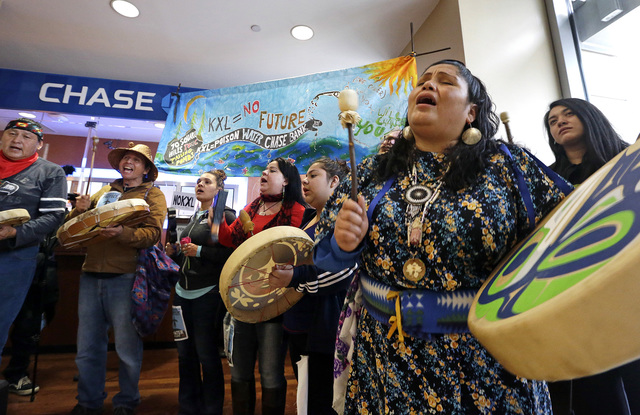Banks need to stop funding projects like the Keystone XL pipeline if we hope to avert climate disaster. That’s why on May 8th, 350 Seattle and Indigenous partners shut down 13 branches of JPMorgan Chase, the largest provider of credit to TransCanada. Now activists are calling for a national day of action.
Earlier this month, a coalition of Native Americans and 350 Seattle activists used nonviolent civil disobedience to shut down thirteen branches of JPMorgan Chase across the City of Seattle. Twenty-six people were arrested and the action made front page news locally, and caught the attention of several national outlets.
This bold action comes at a time when the financial sector’s role in enabling the climate crisis is facing unprecedented scrutiny.
Prompted by passionate advocates, Seattle recently became the first city in the country to break ties with a bank in part because of its funding of a fossil fuel project—the Dakota Access pipeline. Since then San Francisco, Los Angeles, Washington D.C, Philadelphia, Missoula, Davis, Santa Monica, and Providence, as well as a number of tribes, have begun the process of severing ties with banks financing the Dakota Access pipeline, removing over $5 billion worth of business in the process.
Seattle followed up their dumping of Wells Fargo with a City Council resolution—drafted by 350 Seattle activists—that made it clear that the City of Seattle would avoid banking with any financial institution that provides loans to Keystone XL.
On May 9th, the day after our action in Seattle, Native-led organizations, including Honor the Earth, Indigenous Environmental Network and Camp of the Sacred Stones, teamed up with the 121 First Nations and tribes who are part of the Treaty Alliance Against Tar Sands Expansion to launch Mazaska Talks: a campaign calling on organizations, governments and individuals to remove their business from the banks funding all four new tar sands pipelines and the Dakota Access pipeline.
With Trump’s all-out attacks on climate progress, this evolution of the divestment movement to focus on the banks profiting from the climate crisis makes sense. Projects like KXL and Trans Mountain rely on large loans for their construction—the Dakota Access pipeline, for example, was a $3.8 billion pipeline, $2.5 billion of which came from bank loans. As Kinder Morgan appear to be discovering, without these loans it becomes difficult for fossil fuel corporations to find the billions required to build new infrastructure projects. In other words: if you stop the flow of dollars, you keep the oil in the ground.
There is another reason why targeting the banks makes sense: fossil fuels make up a relatively small percentage of their overall business. On average fossil fuels only represent between 1% to 4% of the big banks’ assets. It is clear there will be a time when investing in fossil fuels—this relatively small part of their business—will no longer be worth the reputational damage that such investments cause. It is our duty to force that time as quickly as we possibly can, and it may arrive sooner than we think: Earlier this month US Bank became the first bank in the United States to announce that it would no longer be investing directly in new oil and gas pipelines (though it’s worth noting that US Bank does continue to provide billions of dollars in “lines of credit” to companies building tar sands pipelines).
Loaning to big projects, of course, is normal business practice for big banks. But there comes a time when what was once considered normal—be it slavery, a sweatshop, or sexual harassment—is seen to be profoundly immoral. When it comes to protecting a livable planet for our children, we have come to that moment: with climate change already causing the deaths of over 150,000 people a year, as well as the relocation of entire nations and the collapse of ecosystems, the time is now for us to make it crystal clear to the banks that they will be held accountable for investments in projects like DAPL and KXL.

AP Photo/Elaine Thompson
We know that successful civil disobedience actions like those on May 8th—coupled with pressuring our cities, churches, universities and local non-profits to sever ties with the banks enabling the climate crisis—represent the most effective way for us to tell CEOs like Chase’s Jamie Dimon that we will not stand idly by as you profit from the destruction of our planet. But we also know that May 8th will have been for naught, unless it inspires others to act; unless it inspires increased escalation, increased pressure, increased commitment.
This is why, alongside Mazaska Talks and Last Real Indians, we are now calling on 350 groups and climate justice groups around the country to join together for a national day of action targeting the banks most enabling the climate crisis.
To this end we have created this Mass Action Toolkit, which outlines the organizing model we used to simultaneously shut down 13 banks. But even if your group only has the capacity to disrupt or shut down one bank, we ask you to please fill out this form and get involved. You can play a vital role in ensuring that, together, we rattle the cages of Wall Street.
The financial sector is not only morally culpable in the climate crisis, it is enabling the climate crisis. It’s about time that we showed them we’re not going to stand for their profiteering from destruction any longer. Together, we have that power.
We hope you can join us.
~~~
To learn more about the movement to end the banks enabling of the climate crisis please visit: www.mazaskatalks.org